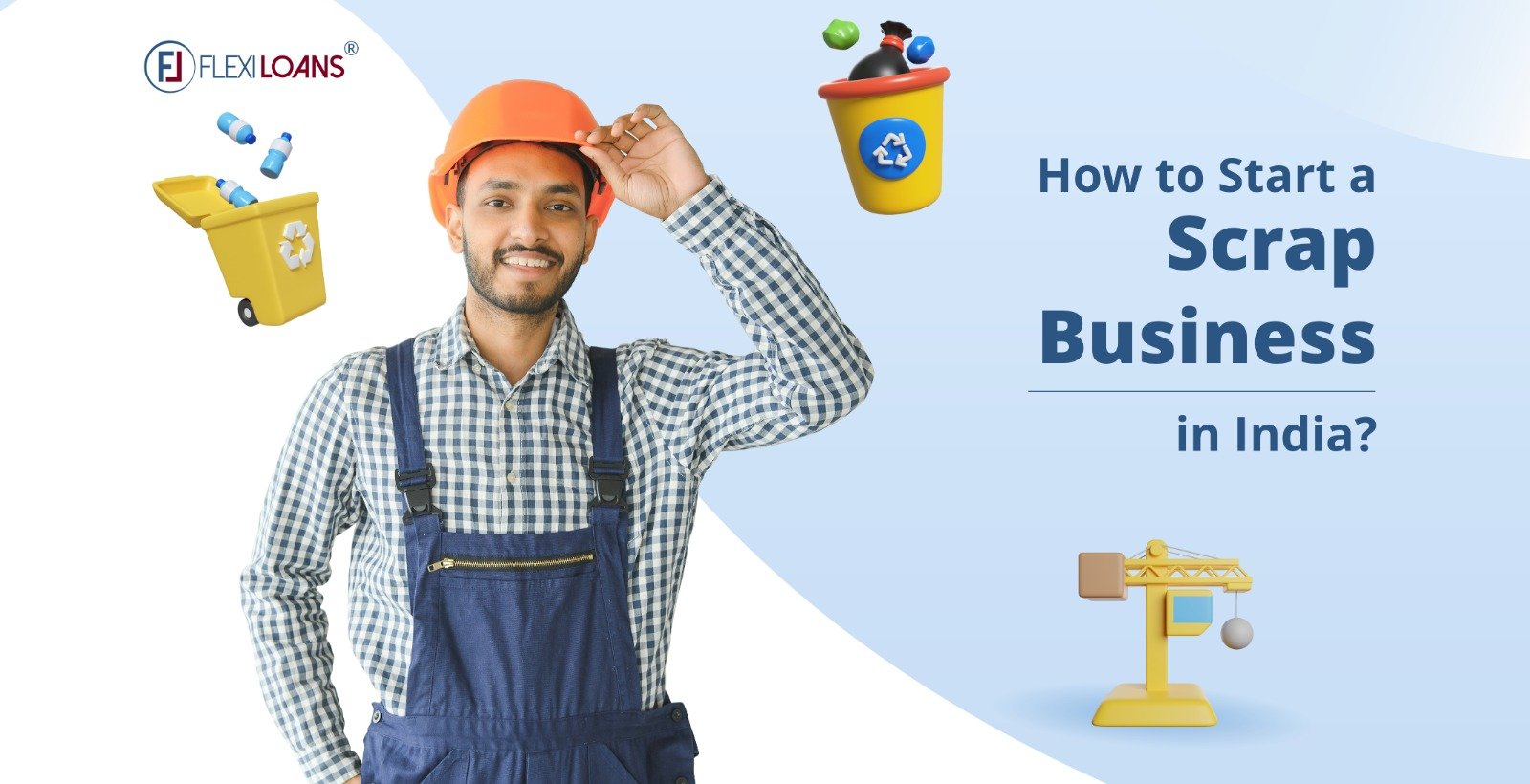Jan 03, 2024
Sep 25, 2025

A scrap business is a lucrative venture in India. There is a tremendous demand and supply of scrap materials in the country. According to a Ministry of Environment, Forest and Climate Change report, India generates about 62 million tonnes of waste annually. Out of this, 45 million tonnes are recyclable. Also, our country imports about 7 million tonnes of scrap metal every year, making it the world’s second-largest importer of scrap metal.
Recycling scrap materials generates revenue, creates employment opportunities, saves energy, conserves natural resources, and lowers greenhouse gas emissions. Starting a scrap business is easy if you know the basics outlined in this article.
Best Scrap Business Ideas in India
- Metal scrap business: Metal is one of the most sought-after materials in the recycling market. You can melt it and reuse it for various purposes. You can collect metal scraps from households, industries, and construction sites, process the scrap yourself, and make products like utensils, furniture, or art.
- Paper scrap business: It is another recyclable waste that you can collect paper from offices, schools, or publishing houses and sell it to paper mills or paper recycling plants. You can also make paper products like bags, envelopes, or notebooks from the paper scrap.
- Plastic scrap business: Plastic is one of the most problematic materials in terms of waste management. It takes a long time to degrade and harm the environment and wildlife. However, if you recycle it, you can turn the waste into valuable products like bottles, containers, and toys.
- Glass scrap business: .You can collect glass scrap from hotels, bars, and restaurants and sell it to glass recycling plants or glass manufacturers. You can also make glass products from glass scraps like jars, vases, lamps, etc.
How to Start a Scrap Business?
Step 1: Market Research
Market research is gathering and analysing information about your area’s demand, supply, competition, and pricing of scrap materials. Market research will help you to:
- Identify the types and quantities of scrap materials that are available and in demand in your area
- Find reliable suppliers, buyers, and customers for your scrap business
- Determine the best prices for buying and selling your scrap materials
- Assess your competitors’ strengths and weaknesses and find your competitive edge
You can conduct market research by reviewing online materials, conducting surveys and interviews, or making field visits. After conducting market research, compile and analyse the collected data and information. You should identify the key trends, patterns, and insights to make an action plan for your business.
Step 2: Licenses and Permits
They are the legal documents that authorise you to operate your scrap business in India. Licenses and permits will help you to:
- Comply with the laws and regulations of the central, state, and local governments
- Avoid any legal issues or penalties for violating the rules or norms of the scrap industry
- Establish your credibility and reputation among your suppliers, buyers, and customers
- Avail the benefits and incentives offered by the government for promoting the scrap industry
Some of the licenses and permits that you need to obtain to start a scrap business in India are:
- Business license: This document grants you permission to start and run your scrap business in India. You can apply for a business license from your area’s local municipal corporation or district industries centre (DIC).
- GST registration: You must register your business under GST if your yearlong turnover exceeds Rs. 40 lakhs (Rs. 10 lakhs for northeastern states).
- Trade license: A trade license is a document that certifies that your business is following the health, safety, and environmental norms set by the local authority.
- Pollution control board certificate: This document verifies that your business complies with the state and central governments’ pollution control norms and regulations. You can get this certificate from your area’s state pollution control board (SPCB) or Central Pollution Control Board (CPCB).
The fees and procedures for securing these licenses and permits may differ depending on your location, business type, and business size.
Step 3: Funding
Funding is raising money for your business. It will help you to:
- Purchase or rent the equipment and storage space for your scrap business
- Pay for the salaries, wages, and benefits of your employees and workers
- Cover the operational and maintenance costs of your scrap business
- Expand and grow your scrap business in the future
To secure funding for your business, you can apply for a business loan with lending institutions, submit an application for grants, or partner with investors.
Remember, each of the funding options has its own advantages and disadvantages. You should choose the best option for your scrap business based on your needs, goals, and capabilities. Compare the business loan interest rate, repayment terms, business loan eligibility criteria, etc., of different sources.
Step 4: Equipment and Storage
The fourth step of starting a scrap business in India is to acquire the equipment and storage space. Equipment and storage are your physical assets to operate your business. Equipment and storage will help you to:
- Collect, transport, and store your scrap materials
- Process your scrap materials into raw materials or products
- Measure, weigh, and label your scrap materials or products
- Sell or deliver your scrap materials or products to your buyers or customers
Some of the equipment and storage space that you need to start scrap work are:
- Containers are receptacles you use to store and transport your scrap materials or products. You can use metal bins, drums, crates, or boxes, depending on the type and quality of your scrap materials or products.
- Scales are devices that you use to measure and weigh scrap products. You can use digital, mechanical, or platform scales, depending on the accuracy and capacity of your scrap materials or products. Ensure that your scales are calibrated, certified, and reliable.
- Shredders are the machines you use to cut or shred your scrap materials into smaller pieces. You can use single-shaft shredders, double-shaft shredders, or four-shaft shredders, depending on the speed and power of your scrap materials.
- Melting machines help in melting your scrap materials into liquid form. You can use induction, electric arc, or blast furnaces, depending on the temperature and volume of your scrap materials.
- Storage facilities refer to warehouses, godowns, and sheds where you keep scrap products. Ensure your storage facilities are well-ventilated, pest-free, and fireproof.
Step 5: Processes and Products
Processes and products are the activities and outcomes you perform and produce for your scrap business. They help you to:
- Convert your scrap materials into raw materials that can be sold or used for making new products
- Create value and generate revenue for your scrap business
- Meet the needs and expectations of your buyers and customers
- Build up your reputation and brand image in the scrap market
Some processes and products that you can implement and offer for your business are:
- Sorting separates your scrap materials into categories based on their type, quality, and condition. You can use manual sorting, mechanical sorting, magnetic sorting, etc., depending on the efficiency and accuracy of your scrap materials. It will improve the quality and value of your scrap materials and reduce waste and contamination.
- Cleaning removes dirt, dust, grease, and oil from scrap materials. You can use water, detergent, or solvent for this. The cleaning process enhances the appearance and performance of your scrap materials and prevents corrosion and deterioration.
- Cutting reduces the size and shape of your scrap materials to fit your equipment and storage. You can use shears, saws, and torches for this.
- Casting shapes your melted scrap materials into solid form by pouring them into moulds. You can use sand casting, die casting, or investment casting. It will help you create new products from recycled metals or materials, such as utensils, furniture, and jewellery.
- Labelling means attaching labels or tags to your scrap materials or products. You can use stickers, stamps, and barcodes for this purpose. Labelling provides the details and specifications of your scrap materials or products, such as weight, grade, price, etc. and facilitates the tracking and tracing of products.
Conclusion
Starting a scrap business journey in India promises not just profitability but also contributes to environmental sustainability. You can play a central role in conserving natural resources by converting waste into valuable resources.
You can establish a scrap business by securing licenses, obtaining funding through lending institutions like FlexiLoans, and getting the right equipment.
FlexiLoans has got your back with range of business loans. We offer you a variety of options like small business loans, term loans, MSME loans, collateral-free business loans, and many more. FlexiLoans’ quick business loans ensure you get your finances exactly when you need them through a fully online application process and quick processing. With determination and adherence to best practices, you are not just starting a business but becoming a crucial part of India’s move towards a greener, more sustainable future.
FAQs
A scrap business involves collecting, processing, and selling recyclable materials like metal, paper, plastic, etc.
Due to environmental awareness and government initiatives, India has a growing demand for recycled materials.
Common materials include ferrous and non-ferrous metals, paper, cardboard, plastic, and electronic waste.
No specific qualifications are required, but understanding the recycling industry and local regulations is beneficial.
Basic equipment includes a weighing scale, transportation vehicle, storage bins, and safety gear for workers.
Build relationships with local businesses, industries, and households. Advertise your services to attract potential suppliers.
Consider factors like current market prices, transportation costs, and the quality of materials when determining your pricing.
Challenges may include fluctuating market prices, competition, and compliance with environmental regulations.
Profits vary based on factors like the volume and quality of materials, market prices, and operational efficiency. Continuous efforts can lead to a sustainable income over time.
Utilize online platforms, social media, and local advertising to promote your services. Networking with businesses is also essential.







